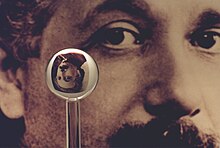Wikipedia:Featured picture candidates/Gravity Probe B
Appearance

Very encyclopedic and a good picture as well, good contrast, framing, sharp, and large size. Great concept showing the refraction in the sphere. It appears in Gravity Probe B and Sphere, The image was created by NASA.
- Nominate and support. - Ravedave 04:05, 18 April 2006 (UTC)
- Oppose, Subject is too small. It is not apparent that this sphere is the most perfect sphere ever created. Looks like an ordinary ball-lens to me. --Dschwen 06:14, 18 April 2006 (UTC)
OpposeBad scan (from slide?): Many dust specks, fuzzy in full size. Intriguing subject, though. --Janke | Talk 06:35, 18 April 2006 (UTC)- Recuse self - I uploaded this but I'm not sure I'd nominate it for FP. anywho, while we're all here maybe someone can clear something up. I marked the image as showing a sphere which is only surpassed in perfection by neutron stars [1]. anon 85.70.2.56 however, says that "according to recent numeric simulations, neutron stars are far from spherical shape due to extreme magnetic field" which would seem to qualify this little quartz ball as being the most perfect sphere in the known universe. which is correct?--Deglr6328 16:53, 18 April 2006 (UTC)
- Comment. Anyone know where I can get one of these? ;) --Dante Alighieri | Talk 19:39, 18 April 2006 (UTC)
- Oppose - I do hope that the image is a scan, or a very dodgy photo, otherwise it seems that the most perfect sphere in the universe has a piece of fluff stuck to it! The subject is indeed very intriguing, but the image quality doesn't make the grade. BigBlueFish 21:45, 18 April 2006 (UTC)
- Support Terrific image. I cannot spot any dust or fluff on close examination of the close-up. So-called "dust" may be in fact the grains of the Einstein photo. Bwithh 00:23, 19 April 2006 (UTC)
- Comment There is, in fact, a significant amount of dust. Just look in the upper left hand corner, to start. ~MDD4696 01:01, 19 April 2006 (UTC)
- Comment - Note in particular the fibre-like speck on the sphere itself (or at the position of the sphere), near the bottom right corner of the inverted image of Einstein, about in line with his hairline. It's too sharp to have been part of the background image. --86.136.18.25 16:28, 19 April 2006 (UTC)
- Comment There is, in fact, a significant amount of dust. Just look in the upper left hand corner, to start. ~MDD4696 01:01, 19 April 2006 (UTC)
- Neutral, I had thought about nominating this myself but there are obviously some problems with the dust. the wub "?!" 23:39, 19 April 2006 (UTC)
- Comment </Wikibreak> I have uploaded over the orig a de-specled version that is slightly smaller (yet still 1280 pix tall). If you cant zoom way the heck in you can't see the dust. -Ravedave 01:45, 20 April 2006 (UTC)
- Much better - you got rid of the dust, but there are still issues, the ball still looks soft (should be really crisp if it's so perfect), and the support is tilted. Changing vote to neutral. --Janke | Talk 05:02, 20 April 2006 (UTC)
- Fixed tilt, all .55 degrees of it :P. Cant fix the blurry sphere, it probably isnt FP quality. I may start using Wikipedia:Picture_peer_review -Ravedave 03:09, 21 April 2006 (UTC)
- Comment Maybe NASA would have better luck with POV-ray...Jonnyapple 21:41, 24 April 2006 (UTC)
Not promoted ~ Veledan • Talk 17:48, 25 April 2006 (UTC)
